Cómo ganar en el 'Sealed': Consejos prácticos || How to win in the 'Sealed': Practical tips
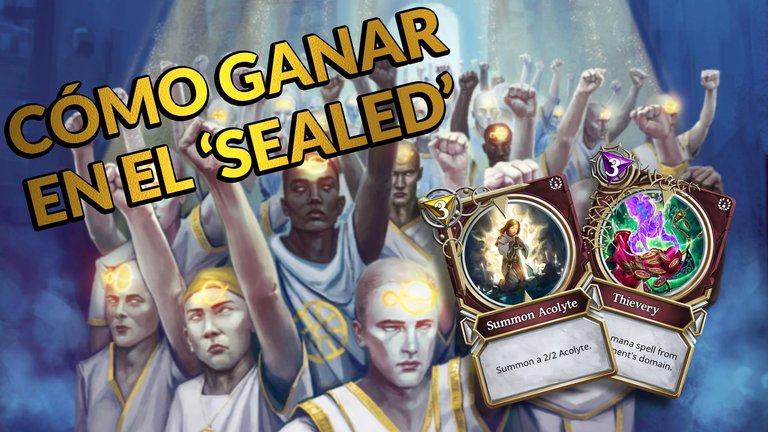


El modo Selaed de Gods Unchained me genera un particular sentimiento de dualidad. Hacie este sostengo en la actualidad una relación amor/odio que me lleva a pensar muchas veces que se basa en una cuestión de habilidad pura y capacidad para la construcción de mazos; y unas tantas otras concluyo que la línea entre el éxito y el fracaso en una tanda de partidas se trata casi completamente de suerte. Sin embargo, de mis "noches de sealed" he rescatado ciertos puntos que creo, en la mayoría de los casos, podrían servir para cualquier jugador a mejorar su rendimiento de la forma que lo han hecho para un servidor.
De buenas a primeras, sobre todo si los resultados positivos no acompañan, lo más fácil es pensar que el segundo planteamiento del párrafo anterior es el acertado: el ganador será el que se vea beneficiado por el azar. Ciertamente esto no es del todo errado; al fin y al cabo, Gods Unchained es un TCG y, como tal, el factor suerte jugará un papel fundamental (en especial en el robo de cartas y mulligan); pero no es una verdad absoluta. La pequeña variación, eso que posiciona al que gana los siete enfrentamientos en un escalón por encima del que no, recae en la habilidad. No solo en el transcurso de la partida, más bien en el Sealed la habilidad se pone a prueba, en especial, antes de iniciar.
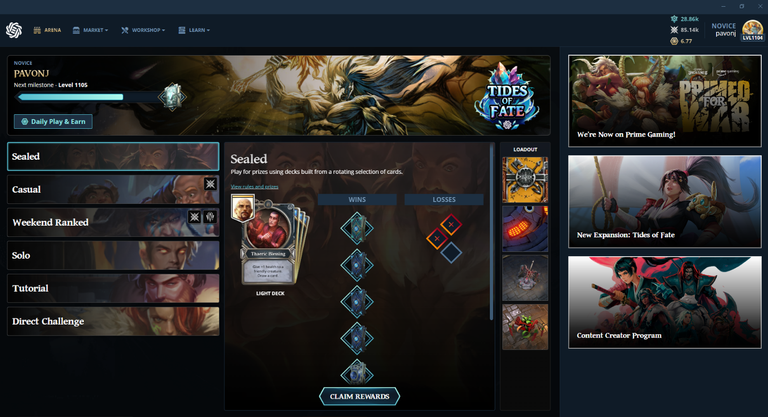
La construcción de mazos es lo más importante de todo esto. Aunque parezca una obviedad decirlo, me he topado decenas de veces con comentarios similares a «Me tocó un pool de cartas pésimo» o «Ninguna de mis cartas sirve» y demás parecidos. A pesar de que sí podría llegar a pasar que la suerte jugara todo en nuestra contra, la realidad es que muy rara vez (por no decir que nunca) estaremos frente a un abánico de opciones (cartas) a las que no se les pueda sacar provecho. Simplemente no sabemos (y me incluyo) cómo rescatar sus mayores virtudes ni entendemos con qué arquetipos están compitiendo otros jugadores.
Sobre esto último aconsejo ir a lo fácil: olvídate de los mazos control y las sinergias por tribus. La actualidad del Sealed (y entiendo que esto podría cambiar en el futuro, pero en el presente es así) se basa en el tempo y el control sobre la mesa. Así que lo ideal es crear una curva de maná en tus cartas, concentrándote principalmente en criaturas, desde las de coste uno a costes más altos. De ser posible, creo que los mazos Zoo son, de hecho, los más efectivos para este modo. Si no es posible, un buen midrange con algún Rapture Dance o Inferno, para los momentos apremiantes, no estaría de más. No obstante, ningún arquetipo servirá de mucho si no elegimos el poder de dios adecuado.
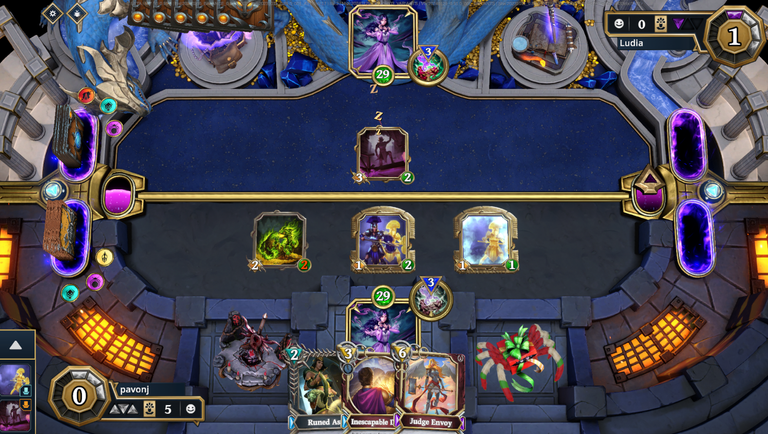
Y es esa quizá la decisión más difícil, y en la que la mayoría erramos. En mis primeras tandas llegué a pensar que Magebolt (Magia, dos de maná, «Haz 1 de daño») sería la mejor opción como poder de dios, pero, dada mi experiencia, ahora me arriesgaría a decir que es una de las peores. Entendiendo que el control sobre la mesa juega un papel fundamental acá. Entonces las mejores opciones, por lógica simple, deberían ser aquellas que invoquen una criatura; y así es, aunque existe una pequeña excepción. Si tuviera que ordenarles por relevancia/efectividad diría que van de esta forma:
· Thievery (Engaño, tres de maná, «Elige un hechizo del dominio de tu oponente»)
· Summon Acolyte (Luz, tres de maná, «Invoca un Acolyte 2/2»)
· Animal Bond (Naturaleza, dos de maná, «Invoca un Badger 1/2 con confused»)
· Raid (Guerra, dos de maná, «Invoca un Valknir Raider 1/1»)
¿Por qué Thievery sería el mejor poder de dios para Selaed si este no invoca ninguna criatura? La repuesta simple: otorga una gran variedad de opciones en cuanto a hechizos. La gran mayoría de los hechizos de coste uno de maná son excelentes, y este poder nos permite elegir uno entre tres, lo cual aumenta nuestras posibilidades de elegir algo que afecte al rival y, en consecuencia, nos beneficie. Sin embargo, me he topado con ocasiones en las que el pozo de cartas propicia que elija Summon Acolyte antes que el ya mencionado. Estos dos sin dudas son los mejores poderes de dioses para el Sealed.
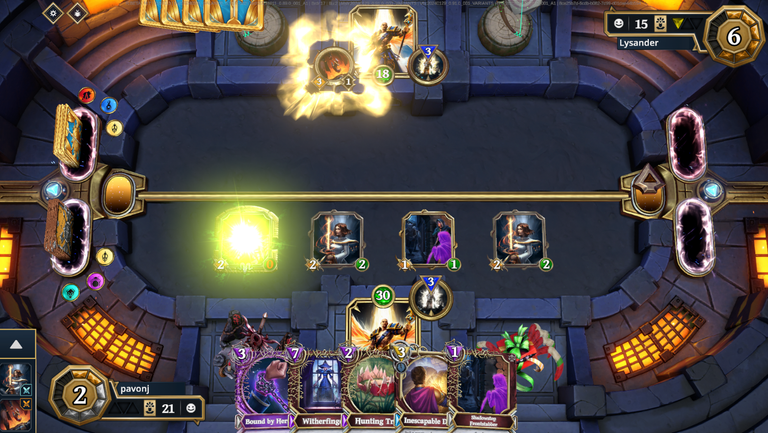
Por último, he de mencionar que si existe algo determinante para la mejoría de mi rendimiento es este apasionante e irritante modo de juego es la paciencia. Dicho de otra forma: un error que cometí muchas veces, e incluso sigo cometiendo (pero en menor medida) fue jugar mis cartas antes de tiempo. Echar "toda la carne al asador" y luego acabar por quedarme sin opciones. Desde mi perspectiva tanto Sealed como Ranked se tratan de paciencia, pero en el primero de estos el temple debe ser mucho mayor. Evitar caer en la ansiedad de acabar con un esbirro rival (poco relevante) y en el proceso gastar algún hechizo y/o criatura propia que nos podría ser de ayuda en el futuro.
Ese último, creo, es uno de los puntos más significativos que marcan la diferencia entre avanzar o no. Por supuesto, no pretendo expresar mi opinión como un experto. Si bien percibo progresos en mi propio desempeño, sé que aún hay mucho que mejorar. Pero, quizá en alguno de estos párrafos, otro jugador encuentre ese primer paso que necesite para levantar cabeza y ganar, tan siquiera, una partida más.
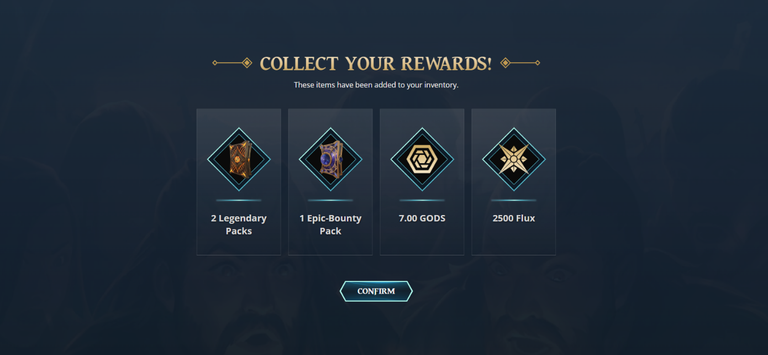
Juan Pavón Antúnez


The Sealed mode of Gods Unchained generates a particular feeling of duality for me. I currently have a love/hate relationship with it that leads me to think many times that it is based on a matter of pure skill and deck-building ability; and many times I conclude that the line between success and failure in a batch of matches is almost entirely a matter of luck. However, from my "sealed nights" I have picked up certain points that I believe, in most cases, could help any player to improve his performance in the way they have done for yours truly.
At first glance, especially if the positive results do not accompany, the easiest thing is to think that the second approach in the previous paragraph is the right one: the winner will be the one who benefits from chance. Certainly this is not entirely wrong; after all, Gods Unchained is a TCG and, as such, the luck factor will play a fundamental role (especially in card drawing and mulligan); but it is not an absolute truth. The small variation, that which positions the one who wins the seven confrontations in a step above the one who doesn't, lies in skill. Not only in the course of the game, but rather in the Sealed the skill is tested, especially before starting.

Deck building is the most important part of all of this. Although it may seem obvious to say it, I have come across dozens of times with comments similar to "I got a lousy card pool" or "None of my cards work" and the like. Although it could happen that luck plays against us, the reality is that very rarely (if ever) we will be in front of an abanic of options (cards) that we can't take advantage of. We simply do not know (and I include myself) how to rescue their greatest virtues, nor do we understand what archetypes other players are competing with.
Regarding the latter, I advise you to go for the easy way: forget about control decks and synergies by tribes. The actuality of Sealed (and I understand that this could change in the future, but at present it is so) is based on tempo and control on the table. So the ideal is to create a mana curve in your cards, concentrating mainly on creatures, from cost one to higher costs. If possible, I think Zoo decks are, in fact, the most effective for this mode. If not possible, a good midrange with some Rapture Dance or Inferno, for pressing moments, wouldn't go amiss. However, no archetype will be of much use if we don't choose the right god power.

And that's perhaps the hardest decision, and the one most of us err on the side of. In my first batches I came to think that Magebolt (Magic, two mana, "Deal 1 damage") would be the best option as god power, but, given my experience, now I would risk to say that it is one of the worst. Understanding that control over the table plays a fundamental role here. So the best choices, by simple logic, should be those that summon a creature; and so it is, although there is a small exception. If I had to order them by relevance/effectiveness I would say they go like this:
· Thievery (Deception, three mana, "Delve a spell from your opponent's domain").
· Summon Acolyte (Light, three mana, "Summon an Acolyte 2/2")
· Animal Bond (Nature, two mana, "Summon a Badger 1/2 with confused").
· Raid (War, two mana, "Summon a Valknir Raider 1/1")
Why would Thievery be the best god power for Selaed if it doesn't summon any creatures? The simple answer: it grants a wide variety of spell options. The vast majority of spells costing one mana are excellent, and this power allows us to choose one out of three, which increases our chances of choosing something that affects the opponent and consequently benefits us. However, I have come across occasions where the card pool makes me choose Summon Acolyte over the aforementioned. These two are undoubtedly the best god powers for the *Sealed.

Finally, I must mention that if there is one thing that is decisive for the improvement of my performance in this exciting and irritating game mode, it is patience. In other words: a mistake I made many times, and even continue to make (but to a lesser extent) was to play my cards early. Putting "all my eggs in the basket" and then ending up running out of options. From my perspective both Sealed and Ranked are about patience, but in the first one the temper must be much higher. Avoid falling into the anxiety of finishing off a rival minion (of little relevance) and in the process expending some spell and/or creature of our own that could be of help to us in the future.
That last one, I think, is one of the most significant points that make the difference between advancing or not. Of course, I do not pretend to express my opinion as an expert. While I perceive progress in my own performance, I know there is still much room for improvement. But, perhaps in some of these paragraphs, another player will find that first step he needs to raise his head and win, at least, one more match.

Juan Pavón Antúnez



I agree, most of the time I loss in RANKED when I am on a rush.
Sometimes desperation makes us make mistakes. But the good thing is that we realize that.
I agree.